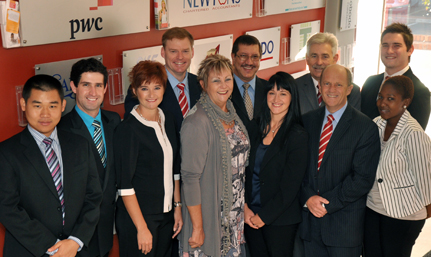|
 |
Infront: Richard Yang (2013 Academic Clerk), Raymond Cramer (2013 Academic Clerk), Me Jana Lamprecht (Lecture), Prof RonellBritz (Chairperson: Centre for Accounting), Me LizelleBruwer (Lecture), Prof HendriKroukamp (Dean: Faculty of Economic and Management Science), ThembiKganane (2013 Academic Clerk).
Back: Prof CobusRossouw (Lecture), Mr KobusSwanepoel (Lecture), Prof Hentie van Wyk (Program Director: Centre for Accounting) and Robert Bode (2013 Academic Clerk)
08 May 2013 |
The B Acc Honours students of the Centre for Accounting have done very well in the Initial Test of Competence (ITC) examination of the South African Institute of Chartered Accountants (SAICA), when 60 out of 65 students passed. It represents a pass rate of 92%. The overall average pass rate nationally is 74% and 86% for those who wrote the professional examination for the first time.
The Centre for Accounting achieved an average pas s rate of 81% over the last three years. Up till now it is the largest number of UFS students that passed the professional examination in one year. The highest pass rate was achieved in 2008 when 95% of the UFS students passed.